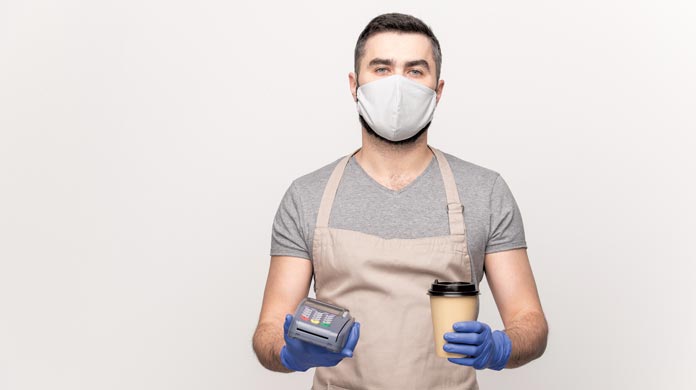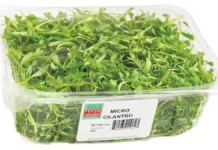
Article By Francine L. Shaw, President of Savvy Food Safety, Inc.
COVID-19 has completely disrupted the foodservice industry. Because of stay-at-home orders, restaurants have been unable to serve guests onsite for months. In certain jurisdictions when restaurants could reopen, they had to follow new regulations to restrict crowds and limit onsite capacity.
CDC protocols mean restaurants and other food businesses must elevate cleaning and disinfecting, implement social distancing, wear personal protective equipment (PPE), etc. These new COVID-19 protocols are in addition to the food safety procedures all foodservice professionals must continue to follow, such as avoiding cross-contamination, storing foods properly, cooking to proper temperatures, accommodating food allergies correctly, etc.
In addition to making major business changes and implementing additional COVID-19 protocols, food businesses must also deal with supply chain disruptions. There have been – and continue to be – product shortages, and food businesses may not be able to consistently secure necessary items.
The COVID-19 crisis has been unexpected, frightening, frustrating, and overwhelming. Now, seven+ months into the crisis, basic COVID-19 protocols have become our “new normal.” For the most part, washing hands, frequent disinfecting, practicing social distancing, wearing face masks, and following other CDC guidelines have become standard operating procedure for food businesses.
Unfortunately, COVID-related changes will likely be long-term and could even have permanent impacts on our industry. In addition to the basic COVID-19 protocols and practices listed above, also implement the following to manage safety, mitigate risks, and make employees and guests feel more comfortable:
• Demonstrate that you’re taking every safety precaution.
Many consumers remain wary about dining out, traveling, shopping, and partaking in other activities, due to the ongoing fear of contracting COVID-19. Adding to consumers’ concerns, recent reports link eating in restaurants with an increased risk of contracting coronavirus. Demonstrate – through words and actions – that you’re taking every precaution to prevent COVID-19, norovirus, Hep A, and other contagious illnesses – as well as foodborne illnesses. Communicate – in person, through social media, via signage and media interviews – that you’re taking every precaution to keep employees, guests, and your community safe. Then walk the walk. Customers should see employees cleaning and disinfecting regularly, keeping proper social distance from others, wearing PPE, and following other guidelines dictated by the CDC and your local jurisdiction. Customers need constant reassurance that you’re prioritizing safety. Otherwise, they won’t give you their business.
• Update your crisis plan.
In our wildest dreams, we could have never envisioned a global health crisis like what we’re experiencing this year. The initial days, weeks, and months of the pandemic were chaotic, as we all grappled with what to do and how to stay safe. COVID-19 reinforced the need for clear, concise crisis management plans to guide us, regardless of the crisis situation. While the specific messaging will depend on the particulars of the incident, keep your plan updated and readily available. Ideally, your plan should identify the crisis team (person in charge, spokesperson, legal representative, etc.) and emergency personnel (e.g., police, fire, ambulance, local health department, poison control, etc.) with all contact information compiled.
• Prioritize training.
Food safety training is more essential than ever before, as employees work to incorporate new COVID-19 protocols on top of other food safety initiatives. Educate every employee about food safety rules and COVID-19 protocols and make training part of each new employee’s onboarding process. Emphasize the importance of following safety rules and COVID regulations and explain why these protocols are so important to secure employee buy-in. Ensure compliance and take immediate corrective actions if/when employees aren’t following protocols. Provide reminders via onsite signage, email, texts, pre-shift meetings, and “refresher” training sessions.
• Develop safer ways to serve food.
Shared food items may be a thing of the past. It’s not currently considered safe to offer buffets, salad bars, and “family style dining” due to the possibility of coronavirus transmission via shared serving utensils and contact surfaces, or due to close proximity to others. Food businesses should provide single-use condiment packets vs. shared bottles. Serve individual meals vs. “family style” shared platters. Offer single servings of pre-packed options rather than a salad bar. Have an employee (with clean hands!) pour coffee for guests rather than allowing them to help themselves to prevent multiple people’s hands from touching the coffee pot’s handle and potentially contaminating it.
• Switch from manual to digital systems.
It’s ironic: at a time when we must elevate our quality and safety inspections to ensure compliance, it’s difficult to secure traditional corporate audits due to COVID-19-related restrictions. Further complicating things: many food businesses still rely on antiquated pen-and-paper systems to monitor important quality and safety initiatives. Manual systems have numerous (and serious) downsides. It’s impossible to get real-time data across a business, human errors are common, paperwork gets lost, etc. Conversely, digital tools and software solutions provide a broader, more accurate, more holistic, real-time view, whether you have one business location or dozens. Tech tools can instantly, accurately provide integrated data about various safety and quality initiatives, allowing you to easily identify (and fix) problems before they become huge liabilities.
• Expand your suppliers.
Looking back, we will always remember the shortages of toilet paper and hand sanitizer caused by the pandemic. During this weird, unprecedented time, supply chains have been disrupted, and food businesses haven’t been able to consistently secure necessary products – from toilet tissue to meat. Continue supporting your regular suppliers – especially local companies and farms that are struggling through this crisis – but also consider expanding your roster of vendors to ensure continuous supplies. Also, vet every potential vendor for quality and safety criteria to ensure an ongoing and safe supply of products.
COVID-19 is more than just a short-term inconvenience; it’s a long-term problem. It’s likely that the 2020 pandemic has changed the foodservice industry forever, with safety protocols that may remain permanent. While this ongoing crisis may be frustrating and overwhelming, concentrate on what you can control. Commit to making your business safer by implementing proper protocols – now and into the future.
 Francine L. Shaw is considered by many as the preeminent voice for food safety and education in the foodservice industry. Through her company, Savvy Food Safety, Inc., Francine provides world-class brands with food safety education, COVID-19 response plans, collaboration on the creation of digital food safety and COVID-19 digital platforms, crisis management, consulting, HACCP writing and implementation, curriculum development, public speaking engagements, and more. She has worked with many prestigious companies, including Starbucks, McDonald’s, Domino’s, Dunkin’ Donuts, Target, Chick-fil-A, Disney, Stop and Shop, Walgreens, Sheetz, GOJO/Purell, Marriott, Omni Hotels & Resorts, RizePoint, Colnspect, and more. Additionally, Francine is frequently featured as a food safety expert in the media, including The Huffington Post, the Dr. Oz Show, iHeartRadio, the BBC World Series Radio, among others. She has published hundreds of articles related to food safety matters.
Francine L. Shaw is considered by many as the preeminent voice for food safety and education in the foodservice industry. Through her company, Savvy Food Safety, Inc., Francine provides world-class brands with food safety education, COVID-19 response plans, collaboration on the creation of digital food safety and COVID-19 digital platforms, crisis management, consulting, HACCP writing and implementation, curriculum development, public speaking engagements, and more. She has worked with many prestigious companies, including Starbucks, McDonald’s, Domino’s, Dunkin’ Donuts, Target, Chick-fil-A, Disney, Stop and Shop, Walgreens, Sheetz, GOJO/Purell, Marriott, Omni Hotels & Resorts, RizePoint, Colnspect, and more. Additionally, Francine is frequently featured as a food safety expert in the media, including The Huffington Post, the Dr. Oz Show, iHeartRadio, the BBC World Series Radio, among others. She has published hundreds of articles related to food safety matters.























